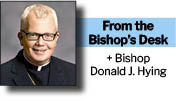
Arthur Schlesinger Jr., a noted United States historian, famously opined decades ago that anti-Catholicism is “the deepest bias in the history of the American people.”
Another historian, John Higham called it “the most luxuriant, tenacious tradition of paranoiac agitation in American history.”
Given the intensity and even violence surrounding the volatile issues of abortion, homosexuality, and transgenderism, the attacks on the Catholic Church in this country have markedly increased of late.
From May 2020 to May 2022, 139 incidents of violence against Catholic Churches occurred in 35 states, including cases of arson, beheaded statues, gravestones defaced with swastikas, smashed windows, pro-abortion graffiti, theft, and desecration of the Blessed Sacrament.
Anti-Catholic, documented hate crimes have risen dramatically in this country in the last 10 years.
History of anti-Catholicism
In the past, American anti-Catholicism found its roots in the European Protestant antipathy towards the tenets and power of the Catholic Church, centered in a rejection of papal authority, the importance of Mary and the saints, belief in the Real Presence in the Eucharist, and the necessity of Sacramental Confession.
This traditional prejudice, coupled with the fact that the vast majority of immigrants flooding America’s shores in the late 19th and early 20th centuries were Catholic, fomented a virulent anti-Catholic, anti-immigrant hatred which became a nativist movement against anything perceived to be foreign to white, Protestant culture.
As a result of the prejudice and hatred against them, American Catholics ardently demonstrated that their faith was not antithetical to being patriotic, loyal U.S. citizens.
They strove to fit in, serving in the military in higher numbers than their percentage of the population, becoming political and economic leaders on all levels, and offering the vast energies and resources of the Church to serve the common good and the wider society. As a result, Catholics have “arrived” in America.
Today, 148 Catholics serve in Congress and six of the nine Supreme Court Justices have some affiliation with the Catholic Church.
In many ways, Catholics have so blended into our society, reaching the pinnacles of power, affluence, and influence, that their opinions and practices are indistinguishable from their fellow citizens. When it comes to religious and moral convictions, this homogenization is not a good thing.
A response to violence
This brief history lesson lends context to the current spate of attacks on the Catholic Church, a violence not principally fueled by the old Protestant prejudices, but rather by our moral stands concerning abortion, sexuality, and gender. Those who push the pro-abortion, pro-homosexuality, and pro-transgender agenda rightfully view the Catholic Church as the largest and most influential obstacle in their path of radical activism.
Many, if not most, political leaders, media, social influencers, corporations, and religious bodies have acquiesced before the power of this agenda. The Catholic Church has not.
With serenity, confidence, and love, She continues to proclaim and teach the truth concerning God and the human person.
Faithful Catholics will call out bigotry wherever they find it, even as contemporary cultural outrage remains highly selective and biased.
Recently, the Los Angeles Dodgers invited the “Sisters of Perpetual Indulgence,” a group that has consistently and blasphemously mocked Jesus Christ, the Blessed Virgin Mary, and the Church, to be honored at their LGBTQ night at the ballpark.
After an outcry from conservatives, the Dodgers withdrew the invitation, only to reinstate it after an outcry from activists on the Left.
Imagine any group which mocks Muslims, Jews, or almost any other category of people besides Catholics, being publicly honored at a ballgame!
It would never happen because the backlash would be mighty and fierce, as it should be. So why is it OK to embrace bigotry against Catholics?
Teaching the truth
The Church teaches the truth about the human person, revealed by God through the Scriptures, Tradition, and natural law, not because we hate or exclude anyone, but because we love everyone and want them to encounter the fullness of life, love, and grace which the Lord offers us through a life of faith and discipleship.
The Church is not willing to propose mere self-contentment as happiness, which is both isolating and divisive, but rather true happiness and joy, which in this life is an arduous but worthy good that unifies us in charity and truth.
Every NO the Church utters against some practice or attitude in our society is only to proclaim an even greater YES to the truths and values, which bring joy and peace to the human heart.
In that vein, the Church says YES to human life and dignity, justice, religious liberty, compassion, forgiveness, solidarity with the poor, beauty, love, the gift of sexuality, marriage, family, friendship, the arts and literature, the value of work, the flourishing of the common good, the importance of political leadership and participation, sports, science, the natural world, joy, peace, and every other activity, value, institution, and experience which makes us authentically human and holy.
There is nothing true, good, or beautiful, which does not find resonance and support in the heart of the Church.
Instead of viewing the Church as the enemy of cultural progress, I pray that all people will come to realize that She is actually the greatest guarantor of human dignity and flourishing.

